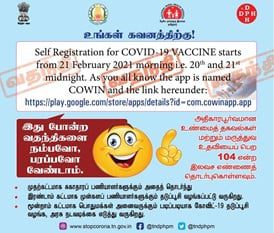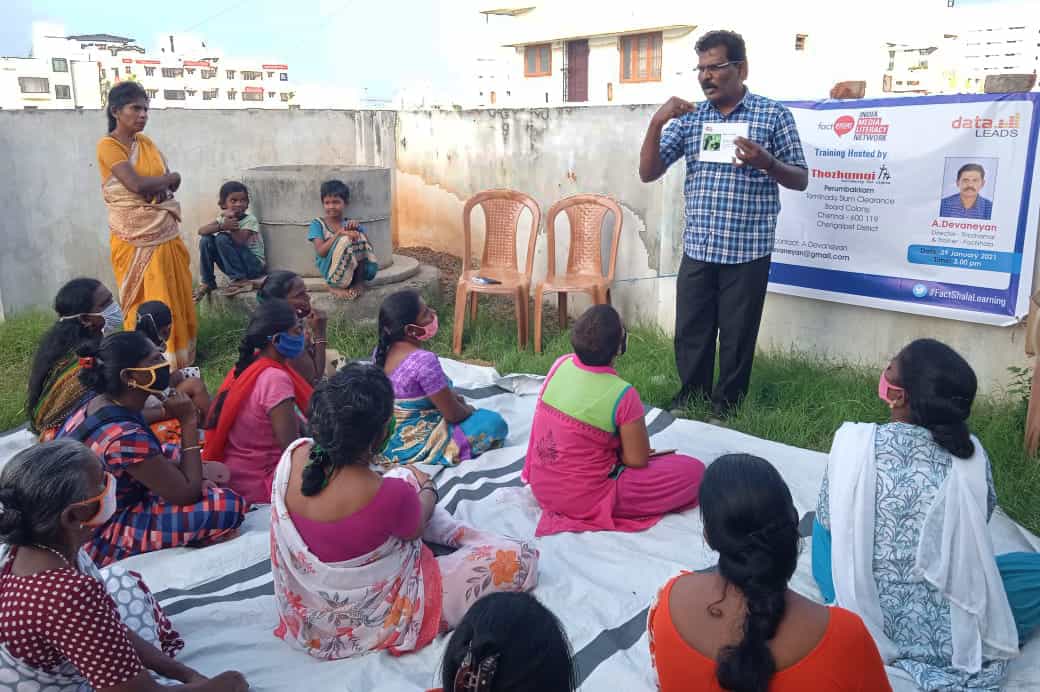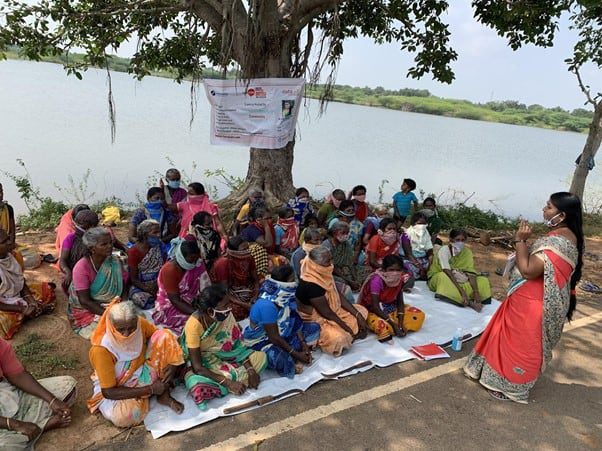Thozhamai, an NGO in Tamil Nadu, India, connects directly with residents in four villages to dispel dangerous disinformation
A fake video, widely circulated on social media, claimed that a child injured in an accident had lost his eyesight and needed money for treatment. The sender urged everyone to share the message, claiming the child would receive one rupee in his account per forward.
The scam went viral quickly. Messages like this often pop up on smartphones in Poondi village, a small hamlet in the state of Tamil Nadu that is home mostly to daily wage labourers and farmers. COVID-19 and vaccine related misinformation has also been equally rampant. For instance, while the government announced that the larger public will get vaccinated after healthcare workers and frontline medical staff, a rumour claiming the contrary – that the government will not provide the vaccination to the common public – was being widely circulated amongst villagers, hampering the vaccination efforts.

While accessing information via smartphones has become common for residents in rural areas like Tamil Nadu, the ability to sift information and misinformation has not. This observation led two members from Thozhamai, an NGO working with vulnerable groups to uphold human rights, to sign up for FactShala – India’s largest media literacy training network – and equip themselves to help those around them from falling for the dangers of misinformation.
Launched by Internews with support from Google.org and the Google News Initiative and run in collaboration with DataLEADS, FactShala helps people in villages and small cities better evaluate and assess online information. At the heart of the effort is a core team of 250 trainers – NGO workers, journalists, fact-checkers, media educators and community radio representatives – who are trained by and on a curriculum built with inputs from media literacy experts. Once trained, they reach out to communities around them to help them understand and navigate their online information ecosystem.
Community workers use their connections to reach local residents
Thozhamai means “solidarity.” As COVID-19 cases and misinformation surrounding it spiked, Thozhamai Director Devaneyan Arasu and Programme Coordinator Lilly Margaret felt a sense of urgency and duty to take FactShala learning to as many more people around them as possible. Despite COVID-19 restrictions, the duo tried their best to connect with villagers as often as they could, and pass on what they had learnt to others so they could better decipher the truth behind viral messages that often flooded their phones.
The villagers that Devanayan and Lilly interact with are often farmers, daily wage labourers, members of self-help groups or shopkeepers. Most communicate only in Tamil, are smartphone users but not highly educated. Many are school dropouts. It’s a challenge for many to give up a few hours of their day to learn about the seemingly distant concept of media literacy. But Devnayan and Lilly do not give up. To encourage participation, they initiate candid discussions by sharing examples of ‘fake news’ from their own lives, and encourage the villagers to talk about any suspicious examples that they have come across. This approach emphasizes how misinformation affects each person in their day-to-day life.

The trainings are often conducted in fields, by the roadside, in shanties or on the riverfront in deep rural areas of Tamil Nadu – it’s most feasible to interact with participants wherever they have assembled to perform their daily wage tasks. Over a span of three months in the last year, Devanayan and Lilly managed to gather different cohorts of villagers at least 14 times in rural areas of Tamil Nadu where they imparted best practices of online media consumption and convinced the participants to exercise caution against falling for viral content on social media.
Devaneyan and Lilly often use their own mobile phones and printed examples to illustrate how viral images and hoaxes appear. Knowledge of regional problems and patterns of misinformation in the lives of these groups was often a reference point for the trainings.
Prodding the participants to reflect on their media practices reminded Lilly of her own journey to media literacy and helped her connect with them. “I feel guilty about the numerous times I had forwarded fake messages before I joined FactShala,” she said. “I never thought about the implications of doing this despite being in the social service sector and working as a trainer for over a decade.
“In villages where literacy rates are low, people spread misinformation based on hearsay even without receiving the message themselves,” Lilly says. “I encourage all trainees to verify information. To do this, they often rely on websites that have Tamil translated versions and voice searching using Tamil. Most of the time, this is more than enough to understand which piece of information is fake.”
Devaneyan points out that “People are not reading the messages in entirety and tend to forward before they have looked at them carefully because they believe in the credentials of the sender. Checking this habit can curb misinformation to a lot of extent.”
However, Lilly is uplifted by the impact of the workshops. “When I see a woman from a self-help group who received my training can go back and identify which message is genuine and which one is impostor content on the phone issued to her by the government, it is very encouraging. It helps them in doing their work effectively and confidently.”
Devaneyan’s experience working for 40 years in these communities helps him draw out the kind of information the villagers are looking for. Many of them want to know the correct sources for getting information about government schemes as they are eligible beneficiaries. Others are concerned about the digital safety of their children as many attend online classes due to the pandemic. For several others, the idea that they could have unknowingly caused loss of life and reputation by spreading viral messages is disconcerting.
Staying connected with participants
The strength of FactShala lies in its ability to reach underserved communities through local trainers, says Devaneyan. “Participants … often reach me hours, days and weeks after the training to clear any confusion about a piece of information they have found online. They continuously reach me for verifying info. I direct them to fact-checking sites or how to search for the correct information. Often, [they] get back saying they feel empowered because they now know how to verify information.”
Hoping to reach more people, Devaneyan wants to develop an illustrated book about misinformation to take FactShala to the masses.
“I’m a social worker, so really all [Devaneyan’s] examples were very supportive and helpful to understand about the consequences of sending fake messages,” said Ms. Jency, Deputy Director for the Centre for Child Rights and Development, who participated in a training. “This really is going to help us sensitize our children and youth about the importance of digital media literacy.”
Just like Lilly and Devaneyan, their fellow Factshala trainers have been working relentlessly since last year, and despite COVID-19 restrictions and hurdles, reached over 35,000+ individuals through more than 800 sessions they organised – both online and in-person – in many small cities and rural areas of India.
Factshala is a collaborative media literacy effort launched by Internews with support from Google.org and the Google News Initiative and run in association with DataLEADS. The initiative has been made possible with generous technical support from curriculum partners including the Stanford History Education Group, the BBC World Service, Hong Kong University, the Asian Network of News & Information Educators, Amity University, Noida, BoomLive, Don Bosco University, Assam and Indian Institute of Journalism and New Media, Bangalore.
